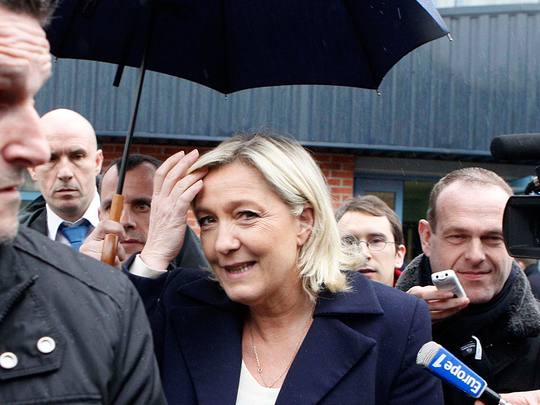
London: British Prime Minister David Cameron paid a courtesy call on Queen Elizabeth II, then launched a most uncourteous attack on his main political rival, as campaigning formally began Monday in the most unpredictable UK election in decades.
The royal audience — possibly Cameron’s last as prime minister — came as Britain’s Parliament was officially dissolved ahead of the May 7 vote.
Polls, bookmakers and politics-watchers say the election is too close to call, and no party is expected to win a majority of seats in the House of Commons.
Some form of coalition government is likely, and smaller parties — such as the Scottish and Welsh nationalists, the Greens and the anti-Europeans — could hold the balance of power.
While issues such as the European Union and immigration will play a big role in the campaign, both Cameron’s Conservatives and their main opposition, the Labour Party, are focusing their pitches on the economy.
Cameron said a Labour victory would bring “economic chaos” and threaten Britain’s recovery from the Great Recession.
“Debt will rise and jobs will be lost as a result,” he said.
Speaking outside 10 Downing St. after meeting the queen at Buckingham Palace, Cameron said when he took office in 2010, “Britain was on the brink.”
Now, he said, “Britain is back on her feet again,” and growing faster than other G7 economies.
But Labour leader Ed Miliband argued that for many voters, that recovery “feels like it’s happening to someone else, somewhere else.” He kicked off campaigning with a speech aimed at reassuring business that Labour won’t increase tax and red tape.
And he called the Conservatives’ vow to hold a referendum on whether Britain should leave the 28-nation EU a “clear and present danger” to British businesses.
Cameron’s visit to the palace was a courtesy, since this election ends the historic practice of prime ministers asking the monarch to dissolve Parliament. That is now done automatically. The same law fixes election dates to the first Thursday in May every five years unless the government loses a confidence vote in Parliament. Britain’s opposition Labour leader Ed Miliband will say on Monday that Prime Minister David Cameron’s pledge to hold a referendum on European Union membership will subject business to two years of chaos if the Conservatives win the election.
Campaigning in Britain’s closest national election in decades will start on Monday after Queen Elizabeth dissolves parliament at Cameron’s behest, teeing up an unusually fraught battle to govern the $2.8 trillion economy.
Cameron, whose Conservatives are neck and neck with Labour in most polls, has promised to renegotiate Britain’s EU ties ahead of a referendum by the end of 2017 if he wins on May 7.
In a full-page advert in the Financial Times newspaper on Monday featuring quotes from business leaders, Labour warns the threat of a British exit from the EU is “The biggest risk to British business”.
“There could be nothing worse for our country or for our great exporting businesses than playing political games with our membership in Europe,” Miliband will say at a speech in London later on Monday, according to extracts released in advance.
“It is a recipe for two years of uncertainty in which inward investment will drain away, two years of chaos in which businesses will not be able to plan for the future, and two years of wasted opportunities for progress, for profit, for prosperity: a clear and present danger to British jobs, British business and British prosperity.” Cameron, whose party is better trusted to run the economy according to opinion polls, will on Monday warn that a Labour government risked “economic chaos” and would put up taxes.
Some in the business community have accused Miliband of demonising big business and fear his plans for a more hands-on approach to regulation in sectors like banking and energy could make Britain less attractive to investors.
Speaking to the Telegraph newspaper, businessman and Labour donor Assem Allam said several of Labour’s policies, including a plan for an extra tax on high value properties and a higher top rate of income tax, “penalises” wealth creation and said the Conservatives were stronger on the economy.
“This is in the genes of the Conservative Party, their ability to get the economy of the country on the right track. In actual fact I believe they are the best party in Europe in managing the economy,” he said.












